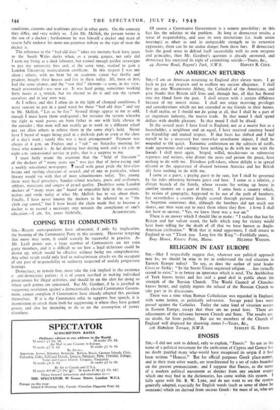COPING WITH COMMUNISTS
Sia,—Recent correspondents have advocated, if only by implication, the banning of the Communist Party in this country. However tempting this move may seem, it could scarcely be successful in practice. As Mr. Lyall points out, a large number of Communists are not even party members, and it is difficult to see how a legal definition could be drawn up, which would be effective without being too comprehensive. Any other result could only lead to indiscriminate attacks on the occupant of any post of responsibility or authority suspected of unduly progressive leanings. Democracy, to remain free, must take the risk implied in the existence o anti-democratic parties: it is of course justified in making individual prosecutions for illegal activities, and should be on the alert for doing so where such parties are concerned. But Mr. Gardner, if he is justified in suggesting revolution against a democratically elected Communist Govern- ment, cannot complain if Communists have already adopted this position themselves. If it is the Communist ethic to suppress free speech, it is inconsistent to attack them both for suppressing it where they have gained power, and also for intending to do so on the assumption of power elsewhere. Of course a Communist Government is a remote possibility: in this fact lies the solution to the problem. As long as democracy retains a sense of responsibility, and uses its own institutions (i.e. trade union meetings) as often as and in comparable strength to its extremist opponents, there can be no undue danger from these foes. If democracy lacks the good sense to defend itself successfully with its own weapons and principles, then Mr. .Gardner's question is already answered, and democracy has exercised its right of committing suicide.—Yours, &c.,
44 Avenue Road, Regent's Park, N.W.8. HARVEY R. COI-E.


































 Previous page
Previous page